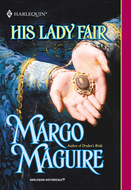Das Buch kann nicht als Datei heruntergeladen werden, kann aber in unserer App oder online auf der Website gelesen werden.
Buch lesen: "The Duke's Governess Bride"
Praise for Miranda Jarrett
THE ADVENTUROUS BRIDE
‘Jarrett provides readers with a delightful,
charming art mystery set in a colourful palette
of the French countryside, ancient churches and
regal Paris. The interesting backdrop and art history
add that little something different that
many readers are searching for.’
—RT Book Reviews
RAKE’S WAGER
‘…a romp brimming with Regency style,
Jarrett’s latest cleverly adds a dollop of poignancy
by throwing Richard’s long-lost son into the mix.
The just-right pace and likable characters deliver
a quick, enjoyable read.’
—RT Book Reviews
Richard wore only his nightshirt, rumpled and loose, and yet somehow revealing far more than his usual dress did—because beneath all that snowy linen he was…naked.
The darker shadows beneath the fabric, the way the linen draped over his body, left no doubt, and Jane’s cheeks flamed at the realisation.
Hastily she looked back up to the safer territory of his face. Or perhaps it wasn’t. In all the time she’d been in His Grace’s employment she’d never seen him this dishevelled, his hair loose around his face and his jaw roughened with a growth of darker beard, his whole expression without its usual reserve and control. It was unsettling, seeing him without his guard like this, and it made him less like His Grace and more simply like any other man.
A large, scarcely dressed, and surprisingly handsome man that she’d just summoned from his bed.
Heavens preserve her—what had she done?
The Duke’s Governess Bride
Miranda Jarrett

Miranda Jarrett considers herself sublimely fortunate to have a career that combines history and happy endings—even if it’s one that’s also made her family far-too-regular patrons of the local pizzeria. Miranda is the author of over thirty historical romances, and her books are enjoyed by readers the world over. She has won numerous awards for her writing, including two Golden Leaf Awards and two RT Book Reviews Reviewers’ Choice Awards, and has three times been a Romance Writers of America RITA® Award finalist for best short historical romance.
Miranda is a graduate of Brown University, with a degree in art history. She loves to hear from readers at PO Box 1102, Paoli, PA 19301-0792, USA, or at susan@susanhollowayscott.com
Novels by Miranda Jarrett:
RAKE’S WAGER
THE LADY’S
HAZARD THE DUKE’S GAMBLE
THE ADVENTUROUS BRIDE*
SEDUCTION OF AN ENGLISH BEAUTY*
THE SAILOR’S BRIDE (in Regency Christmas Weddings)
*linked by character to The Duke’s Governess Bride
MILLS & BOON
Before you start reading, why not sign up?
Thank you for downloading this Mills & Boon book. If you want to hear about exclusive discounts, special offers and competitions, sign up to our email newsletter today!
Or simply visit
Mills & Boon emails are completely free to receive and you can unsubscribe at any time via the link in any email we send you.
Chapter One
If a Woman has any Mind to be wicked, Venice seems to be the last Place in the World to give her better Sentiments.
—‘Miss N’, to the actor Thomas Hull, 1756
Venice—January 1785
Most English gentlemen came to Venice to be amused, whether to view the antique paintings, or to wear a long-nosed mask and dance at the carnival, or to dally with a courtesan in a closed gondola. But Richard Farren, the fifth Duke of Aston, wasn’t here for idle amusement. He had come to Venice for one reason, and one reason only. He’d come for the sake of love.
Turning the collar of his heavy Melton travelling cloak higher against the wind, Richard smiled as he imagined again what his friends in London must be saying of him now. That he was a sentimental fool, surely. That he’d lost his wits, most likely. That the love he was travelling so far to offer would never be returned in equal measure—ah, there were doubtless a good many wagers being made about that, too. So be it. He’d only been able to tolerate a couple of months of loneliness at Aston Hall before he’d given in, and taken off on this journey. But then, caution and care had never been his style, and he wasn’t about to change now. Nothing ventured, nothing gained—that seemed to him not so much a time-worn adage as a good, sound philosophy.
He leaned his arms on the rail of the little sloop, staring out at the wavering dark outline of the shore. This passage from Trieste to Venice was the last step of his long journey, and he’d stood there much of the day, preferring the damp and chill on the deck to the close, fishy stench of the cabin below. Besides, he’d doubted he’d have been able to sleep even if he’d tried. After so many weeks travelling by land and sea, and hard travelling at that, his destination was now only hours away. By nightfall, all his doubts, all his worries, would at last be put to rest—or, if Fate went against him, they’d only have begun.
‘His Grace is eager to reach Venice.’ The sloop’s captain joined him unbidden at the rail. ‘His Grace is happy we make such good speed, yes?’
‘Yes,’ Richard said, hoping that brevity would make the man leave him in peace.
But the captain only squinted up at Richard, pushing his greasy cocked hat more firmly on his head against the wind. ‘His Grace is brave to sail in winter, yes? Ice, snow, wind, brr.’
The captain hugged his arms over his chest to mimic a man warming himself. In return Richard only nodded. He knew perfectly well the perils of travelling at this time of year. He had embarked from England so late in the season, almost in winter itself, that crossing the Continent to Italy through France and the Alps was out of the question. He’d had no choice but to travel by sea, around Spain and Portugal and into the Mediterranean, until he’d become heartily sick of the company of sailing men like this one.
‘Once you’re at Venice, your Grace, you stay,’ the captain continued. ‘No more journey until spring. No Roma, no Napoli, no Firenze, no—’
‘Quite,’ Richard said, his impatience with the man’s company growing by the second. He didn’t need a list of every landmark city in Italy to know that he’d be winterbound in Venice. He was rather counting on it, in fact, given the pleasing female company that was waiting for him there.
‘But his Grace will find willing friends in Venice to warm him, eh?’ The captain winked slyly, studying Richard from his thick dark gold hair to the toes of his well-polished boots with obvious approval. ‘A great English lion like his Grace will have many ladies, eh?’
Richard said nothing, choosing instead to stare out at the water and let the rascal draw whatever unsavoury conclusions he pleased. His dear wife Anne had been not only his duchess, but his best friend and his dearest love, and when she had died, he’d sworn no other woman could possibly replace her in his life. That had been fifteen long years ago, and the pain lingered still.
‘I can tell you the house of the best courtesans in the city, your Grace,’ the captain was saying. ‘I know what you English lords like, eh? A woman who will bring you to such joy, such passion, such—’
‘Enough,’ Richard said curtly, the voice he always used with recalcitrant servants, dogs and children. Why did everyone on the Continent believe English peers were in constant rut, panting after low women in every port? ‘Leave me.’
The captain hesitated only a moment before bowing and backing away, and, with a grumbling sigh, Richard turned back towards the horizon. The sloop was drawing closer to the harbour now, the outlines of the city’s skyline sharpening in the fading light of day. Richard could make out the famous pointed bell tower of San Marco’s, looking precisely the way it did in the engravings in the books in his library at Aston Hall. There was much else beginning to appear from the misty dusk, of course, places Richard supposed he should have recognised as well, but his mind was too occupied with the coming reunion to concentrate on anything else.
He remained on the deck against the urging of his manservant to come below to ready himself for shore, and he ignored the same suggestion from the captain as the crew finally dropped their anchor. Soon he’d be hearing the merry laughter that meant the world to him, and feel the soft girlish arms flung around his shoulders in the embrace he’d missed so sorely these last months.
As the sloop entered the harbour proper, a flurry of small boats came through the mist towards them, odd long skiffs that reminded Richard more of the punts at Oxford than the usual longboats, with the oarsman standing high in the stern-sheets—or what would be the stern-sheets in an English boat. Foreigners had a different name for everything.
‘What are those skiffs, Potter?’ he asked his secretary as the man joined him at the rail.
‘Gondolas, your Grace,’ said Potter, supplying the proper word in his usual helpful manner. Like some small, bustling, black-clad badger, the secretary had ducked from the path of the sailors to join Richard, while the rest of the English party, Richard’s manservant and two footmen, saw to his belongings below. ‘Gondolas are the common means of travel throughout Venice, rather like hackneys in London.’
‘Then pray hail one for us directly,’ Richard said. ‘The sooner we’re off this infernal sloop and on dry land again, the better.’
At once Potter nodded, bowing over his clasped hands. ‘I am sorry, your Grace, but before we can venture into the city, we must clear customs.’
‘Customs?’ Blast, he’d forgotten that every last city and village in Italy considered itself its own little country, complete with a flock of fawning satraps who expected to have their palms greased. ‘Customs.’
‘I fear so, your Grace,’ Potter said. ‘That building on the promontory is the Dognana di Mare, the Customs House of Venice, your Grace, where we must go—’
‘Where you must go, Potter,’ Richard said. ‘You see to whatever needs seeing to, and pay whatever fees the thieving devils demand. I’ll proceed directly to the ladies.’
Potter’s expression grew pinched. ‘Forgive me, your Grace, but surely you must realise that the customs officers will expect you—’
‘They can expect whatever they please,’ Richard said, ‘I’ve more important business this night than to bow and scrape to their wishes. They may call on me tomorrow, at a civil hour, at the—the, ah, what the devil is the place called?’
‘The Ca’ Battista, your Grace,’ Potter said. ‘But if you please, your Grace, we—’
‘Ca’ Battista,’ Richard repeated the house’s name to make sure he’d recall it, and nodded with satisfaction. Though he’d no notion what the words meant, they had a fine, righteous sound to them. ‘Tell the drones in the Customs House to come to me there.’
‘I beg your pardon, your Grace,’ Potter persisted, ‘but Venice has a very poor reputation in its treatment of English visitors. Venice is a republic, and their officials have little respect for foreign persons of rank, such as yourself. It can be a place full of danger, your Grace. This city is not London, and—’
‘But I am not a foreigner,’ Richard said. ‘I am an English peer. Now a boat, Potter, one of your gondolas, at once. At once!’
Soon after Richard was, in fact, in a gondola, seated on a low bench against leather cushions, his long legs bent at an ungainly angle before him. Yet he couldn’t deny the swift efficiency of this peculiar vessel as it glided into one of the channels, or canals, that divided the city and served as a type of watery streets. On this evening, the canal seemed muffled in mist and fog and the endless lapping of the wavelets against the buildings, with the striped poles used for mooring like so many drunken demons lurching through the waters.
Without a city’s usual bustle and clatter from horses, carriages and wagons, the canals seemed oddly quiet, so quiet that to Richard the loudest sound must surely be the racing of his own heart. His long journey, and his waiting, was nearly done.
‘Ca’ Battista, signori,’ the oarsman announced as the gondola slowed before one of the grandest of the houses: a tall square front of white stone, punctuated with balconies and pointed windows frosted with elaborate carvings, which sat so low on the dark water that it seemed to float upon it. The gondolier guided the boat in place before the house’s landing, bumping lightly against the dock. Roused by the noise, a sleepy-eyed porter opened the house’s door and held up a lantern to peer down from the stone steps.
‘Stop gaping, man,’ Potter shouted as Richard clambered from the gondola. ‘Go to your mistress and tell her that the Duke of Aston is here.’
Still the servant hesitated, his face full of bewilderment. With an oath of impatience, Richard swept past him and through the open door, his long cloak swinging from his shoulders. The entry hall was a hexagon, supported by more of the tall columns and pointed arches. A pair of gilded cherubs crowned the newels at the base of the staircase, the steep steps rising up into the murky gloom. The floor was tiled, the walls painted with faded pictures, with everything dismally half-lit by a single hanging lantern. There were no other servants to be seen besides the single hapless porter; in fact, Richard had no company at all except his own echoing footsteps.
He swore to himself with furious disappointment. He was angry and tired and cold, but most of all, if he were truthful, he was wounded to the quick. This was hardly the welcome he’d expected. Where were the kisses and tears of joy? Hadn’t the landlady received his letters? Why the devil weren’t they prepared for him? Blast the infernal Italian post! He knew he’d gambled by coming all this way on impulse, but damnation, he’d paid for the lease of this wretched, echoing house. Wasn’t that enough to earn him at least a show of affection in return?
‘The English lady, most excellent one?’ the porter asked breathlessly as he finally trotted up behind Richard. ‘You wish to see her?’
‘Who the devil else would it be?’ At least the man had worked out that much. In fact, Richard was here to see two English ladies, not just one, but he’d credit the mistake to the porter’s general confusion. ‘Go, tell her I’m—’
‘A thousand pardons, but she waits for you.’ He pointed behind Richard. ‘There.’
Richard whipped around, gazing to where the man was pointing. At the top of the stairs stood a woman, indeed, an Englishwoman, but neither of the ones he’d so longed to see. She was small and pale, her eyes enormous with shock in her round little face. Her hair was drawn back severely from her face and hidden beneath a linen cap, relieved only by a narrow brown ribbon that matched the colour of her equally plain brown gown. She clutched at the rail, clearly needing its support as she struggled to regain her composure after the shock of seeing Richard.
‘Your—your Grace,’ she said, and belatedly curtsied. ‘Good evening, your Grace. You—you took me by surprise.’
‘Evidently,’ he said, his voice rough with urgency. ‘I’m tired, Miss Wood, and eager to see my girls. Please take me to them directly.’
‘Lady Mary, Your Grace?’ she asked with a hesitation that did not please him, not from the woman he’d trusted as his daughters’ governess. ‘And Lady Diana?’
‘My daughters,’ he said, taking another step towards her. His daughters, his girls, his cherubs, the darlings of his heart—who else could have made him come so far? Solemn, dark-haired Mary, the older at nineteen, and Diana, laughing and golden, a year younger. Could any father have missed his children more than he?
A second woman came to join the governess, dark and elegant, a lady dressed in widow’s black. Most likely this was the house’s owner, he guessed, their landlady Signora della Battista.
‘My journey has been a long one, Miss Wood,’ he said, ‘and you are making it longer still.’
‘Your daughters,’ the governess repeated with undeniable sadness, even regret. The older woman spoke gently to her in Italian, resting her hand on her arm, but Miss Wood only shook her head, her gaze still turned towards Richard. ‘You did not receive my letters, your Grace, or theirs? You do not know what has happened?’
‘What is there to know?’ he demanded. ‘I’ve been at sea, coming here. The last letters I had from you were from Paris, weeks ago, and nothing since. Damnation, if you don’t bring my girls to me—’
‘If it were in my power, your Grace, I would, with all my heart.’ With her hand once again on the rail, she slowly sank until she was sitting on the top step, so overwhelmed that she seemed unable to stand any longer. ‘But they—the young ladies—they are not here. Oh, if only you’d been able to read the letters!’
A score of possibilities filled Richard’s heart with sickening dread: an accident in a coach, a shipboard mishap, an attack by footpads or highwaymen, a fever, a quinsy, a poison in the blood. Long ago he’d lost his wife, and grief had nearly killed him. He could not bear to lose his daughters as well.
‘Tell me, Miss Wood,’ he asked hoarsely. ‘Dear God, if anything has happened to them—’
‘They are married, your Grace,’ the governess said, and bowed her head. ‘Both of them. They are married.’
Chapter Two
‘Married?’ roared the Duke of Aston. ‘My daughters? Married?’
‘Yes, your Grace.’ Jane Wood took a deep breath, and told herself that the worst must now be over. Surely it must be, for as long and as well as she’d known the duke, she could not imagine him becoming any more incensed than he was at this moment. Nor, truly, could she fault him for it. ‘Both have wed, and to most excellent gentleman.’
‘Most excellent rascals is more likely!’ His handsome face was as dark as an August thunderstorm, and she realised to her surprise that his expression was filled with as much disappointment as anger. ‘Why did you not put a stop to these crimes, Miss Wood? Why did you permit it?’
‘Why, your Grace?’ She forced herself to stand, to compose herself to give her answer. In his present state, the duke would see any kind of confusion as weakness and incompetence. Rather, further incompetence. His Grace never expected to be crossed, and his temper was legendary. After nearly ten years in his service, Jane knew that much of him, just as she knew that the surest way to calm him was to present the facts in a quiet and rational manner. That had always proved successful with him before, and there was no reason to believe it wouldn’t again.
She took another breath and lightly clasped her hands at her waist, the way she always did. She shouldn’t have let herself be so shocked. She wasn’t some callow girl, but a capable woman of nearly thirty. A calm demeanour was what was required now, she told herself firmly, a rational argument. Yes, yes—rationality and reason. Not a defence, for she believed she’d done nothing wrong, but the even, well-reasoned explanation of the events of the last few weeks that she’d been rehearsing ever since she’d come to Venice from Rome.
But she’d always expected to be delivering that explanation in the duke’s sunny library at Aston Hall, in Kent, once she herself was safely returned to England, and long after he would have read his daughters’ letters. She never imagined he would have come charging clear across the Mediterranean like a mad bull to corner her here on the staircase of the Ca’Battista.
‘Permit me to summon the watch, Miss Wood,’ said Signora Battista in indignant Italian, standing beside her. ‘Or at least let me call the footmen from the kitchen to send this man away. There is no need for you to tolerate the ravings of this lunatic!’
‘But there is, signora,’ Jane murmured swiftly, also in Italian, ‘because he is my master. I am employed in his household, and rely upon him for my livelihood.’
‘Livelihood!’ The signora made a sharp click of disdain. ‘What manner of life can there be with an intemperate male creature such as this one?’
Swiftly Jane shook her head, appalled by such disrespect. She was most fortunate that the duke was proud, as only an English peer could be, of speaking no other language than English, and hadn’t understood the other woman’s comments. Hurriedly she shifted back to English herself.
‘Your Grace,’ she began, ‘if you please, may I present Signora Isabella della Battista, the owner of this fine house? Signora, his Grace the Duke of Aston.’
To Jane’s dismay, the signora’s nod of acknowledgement was also calcuated at the precise angle to signify exactly where a parvenu English duke of only two or three hundred years’ nobility stood in relationship to her, a member of one of the most ancient families of the Republic of Venice who was at present so unfortunately impoverished that she was in need of rich travelling foreigners as lodgers.
‘Madam,’ the duke said curtly to the signora, too caught up in his own anger to perceive her slight. ‘Damnation, Miss Wood, come down here where I can see you properly.’
Jane grabbed her skirts to one side so she wouldn’t trip, and hurried down to stand before him.
Or, rather, beneath him. In the half-year since she’d last seen him at Aston Hall, she’d forgotten how much taller he was than she, and how much larger, too. The duke had a presence that few men could match, a physical energy that seemed to vibrate from him like the rays from the sun. While most men of his rank and age masked their emotions behind a show of genteel boredom, he let them run galloping free. The results could make him either the very best of men, a paragon of charming good nature and generous spirit, or the very worst of devils, when his temper triumphed. Everyone acquainted with the duke knew this to be so, from his daughters to his servants, his neighbours, even his pack of hunting dogs.
As, of course, did Jane. And there was absolutely no doubt as to which side of the duke now held sway.
‘Explain, Miss Wood,’ he ordered curtly. ‘Now.’
‘Yes, your Grace.’ She took another deep breath, and forced herself to meet his gaze. ‘Your daughters have both wed most excellent gentlemen, your Grace, gentlemen of whom I dare to believe you yourself will approve upon acquaintance.’
‘Then why the devil didn’t they wait to ask me properly?’ the duke demanded. ‘Gentlemen, hah. Only the lowest rascal steals away a lady from her family like that.’
‘In ordinary circumstances, they would have, your Grace,’ Jane agreed, blushing at what she must next say. ‘But once your daughters had…ah…become their lovers, it seemed best that they wed at once before—’
‘My girls were ruined?’ the duke asked, sputtering with horror.
‘Not ruined, your Grace,’ Jane said. ‘They were—they are—in love, and love will not be denied.’
‘It would have if I’d been here,’ he said grimly. ‘Their names, Miss Wood, their names.’
‘Lady Mary wed Lord John Fitzgerald in Paris—’
‘An Irishman? My Mary let herself be seduced and wed to an Irishman?’
‘A gentleman of Irish birth, your Grace,’ Jane said firmly, determined to defend the choices that both her charges had made. ‘His lordship is a younger son, true, but his brother is a marquis.’
‘An Irish peerage is as worthless as muck in a stable!’ the duke cried with disgust. ‘At least if the thing was done in Paris with a Romish priest, then I can have it dissolved as—’
‘Forgive me, your Grace, but they were wed properly, before an Anglican cleric,’ Jane said. ‘Lady Mary herself was most conscious of that.’
Pained, the duke closed his eyes. ‘If Mary’s thrown herself away on an Irishman, then what kind of scoundrel has ruined Diana?’
‘Lady Diana’s husband is Lord Anthony Randolph, your Grace, brother to the Earl of Markham.’
‘Another younger son, when with her beauty and breeding, she could have had a prince!’ He shook his head with despair. ‘At least he’s an Englishmen, yes?’
‘His father was, yes. His mother was from an ancient Roman family of great nobility, which is why his lordship has resided in that city all his life.’
‘A Roman by birth, and by blood,’ he said, bitterness welling over his words. ‘An Italian, draped with an English title. An Italian, and an Irishman. My God.’
‘I beg you, your Grace,’ Jane said softly. She loved his daughters, and because of that love, she owed it to them to try to make their father understand. ‘These are good and honourable gentlemen, worthy of—’
‘Miss Wood.’ He cut her off as surely as if the words had been wrought of the steel. ‘I trusted you with my dearest possessions on this earth, and you—you have carelessly let them slip away.’
‘But, your Grace, if I might explain—’
‘No.’ Pointedly he turned away from her. ‘Signora, pray show me to my rooms. I will dine there, alone, as soon as your kitchen can arrange it.’
Signora della Battista knew when to put aside her animosity, especially towards the gentleman who had leased her entire house in the winter, a season of few travellers. The Venetian republic was famous for its mercenaries, and the signora was no different.
‘This house is honoured beyond measure, most excellent sir,’ she said in English. ‘My finest chamber shall be at your disposal, and my cook will prepare his very best to tempt you. This way, if you please.’
As Jane watched the duke follow the signora up the stairs, she saw how his usually squared shoulders sagged with weariness and discouragement, how the jagged white salt-stains from the sea worn into his once-elegant dark cloak seemed to illustrate just how long and arduous his journey here had been. She deeply regretted disappointing him, and though she knew better, she impulsively hurried up the stairs after him.
‘Your Grace, if you please,’ she said softly. ‘If I might speak to you further, to explain and—’
‘You’ve explained more than enough for tonight, Miss Wood,’ he said, brushing her away. ‘If you’ve any sense left at all, you should prefer to wait until tomorrow to hear what else I shall say to you.’
This time, Jane did not follow. Instead she remained behind, alone on the staircase, listening as the voices and footsteps of the duke and the signora grew fainter before they finally faded away.
It couldn’t have gone any worse with his Grace, short of him tossing her into the Grand Canal. Perhaps, Jane thought with growing despair, his Grace was saving that for tomorrow. In any event, she should prepare herself for the worst. Lady Mary and Lady Diana had assured her that their father would understand, and that he couldn’t possibly blame Jane for their choices. Yet already she’d seen that he could, and he would.
She had failed in her duty, failed in a way that in her entire life she’d never failed before. She had put the wishes of her charges ahead of their parent, an unforgivable sin in any governess. Yet still she believed she’d acted in the interests of both sisters. Wasn’t that the first order of her responsibilities? To put the welfare of her charges before everything else? But because of it, she was sure she’d now be turned out here in a foreign country, without references, or worse, with damning ones from the duke.
Slowly she climbed the rest of the stairs and headed down the long hallway to her room. She’d already dined earlier with the signora; there was nothing left for her to do this evening beyond preparing for her seemingly inevitable departure in the morning.
Like all the lesser rooms in grand Venetian houses, hers lay between the elegant bedchambers that were to have been occupied by the duke’s two daughters. One of these faced the front of the house, with tall windows and a balcony that overlooked the Grand Canal, while the other faced the house’s rear courtyard and private garden. Although comfortable enough, Jane’s chamber was undeniably intended for a servant, with a lesser view of the Rio della Madonnetta. Depending on the hour and the cast of the sun, candles were necessary, and the tiny stove for heat did little to relieve the winter damp either.
Always frugal, Jane lit only the single candlestick beside the small bed. She set her two trunks on the coverlet, and briskly set about emptying the clothes-press and chest of her belongings. Given the humble nature of her wardrobe, packing her clothes into the trunks took no time at all, and only her letters now remained to be sorted. She changed from her gown into her nightshift, brushed out her hair from its customary tightly pinned knot and wrapped an oversized wool shawl around her shoulders against the chill. Then, with fresh determination, she scooped the bundled papers into her arms and headed for the front bedchamber.
Once Signora della Battista had understood that Jane had arrived alone, without the English ladies who had been expected, she’d given the governess leave to use the other two bedchambers as well. It was of no concern to the signora who occupied them; she’d already been handsomely paid in advance long ago by the duke’s agents.
But for Jane, the luxurious bedchambers had only added to the dream-like quality of her visit to Venice. Each room had exuberant carved and gilded panelling and swirling paintings of frolicking ancient goddesses and cupids. Huge looking-glasses reflected the view of the canal and the garden, and magnified the dappled light off the water as well.
Jane hadn’t gone so far as to sleep in either of the huge bedsteads—each more like a royal barge than a mere bed—but she had permitted herself to spend time in the rooms, and she’d taken to writing letters at the delicate lady’s desk overlooking the Grand Canal.








